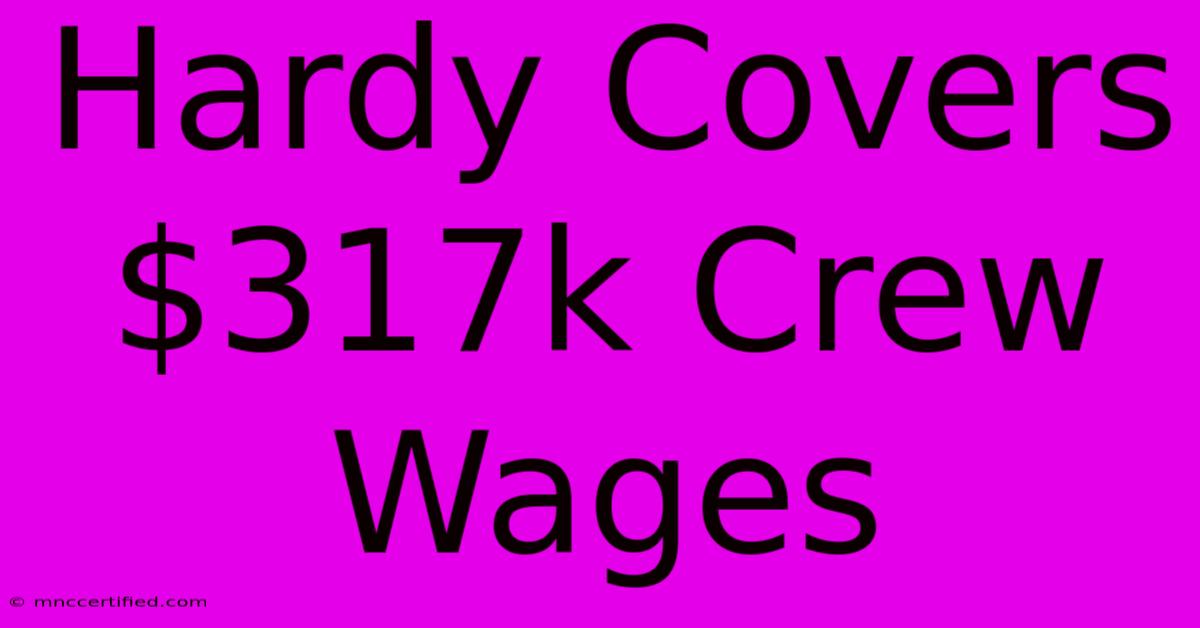Hardy Covers $317k Crew Wages

Table of Contents
Hardy Covers $317k Crew Wages: A Deep Dive into Artist Compensation and Industry Practices
Country music star Hardy recently made headlines for covering $317,000 in crew wages. This generous act shines a light on the often-overlooked financial burdens faced by touring musicians and their support teams. This article delves into the significance of Hardy's action, explores the financial realities of touring, and examines the broader implications for the music industry.
The $317,000 Gesture: More Than Just a Headline
Hardy's decision to personally cover his crew's wages wasn't just a publicity stunt; it represents a significant commitment to fair compensation and worker welfare. In an industry where unpredictable revenues and fluctuating tour schedules are common, crew members often face financial instability. This generous act highlights the importance of prioritizing the well-being of those who work tirelessly behind the scenes to make a successful tour possible. The sheer amount – $317,000 – underscores the substantial costs involved in supporting a large touring operation.
Beyond the Numbers: The Human Story
While the financial aspect is undeniably significant, the human element is equally compelling. Hardy's action speaks volumes about his respect for his crew and his understanding of their crucial role in his success. This gesture fosters loyalty, strengthens team morale, and ultimately contributes to a more positive and productive work environment. It also sets a powerful example for other artists in the industry.
The Financial Realities of Touring: A Challenging Landscape
Touring, while often glamorous, is a complex and expensive undertaking. Beyond the artist's fees, substantial costs include:
- Crew Wages: This includes salaries for stagehands, lighting technicians, sound engineers, transportation personnel, and more. These individuals are essential for a smooth and successful tour.
- Transportation: Bus rentals, fuel costs, and travel expenses add up quickly, particularly for larger tours with extensive travel schedules.
- Equipment Rental & Maintenance: Sound systems, lighting rigs, and other equipment require significant investment in rental fees and ongoing maintenance.
- Venue Fees & Production Costs: Venues charge rental fees, and production costs can include staging, security, and other logistical elements.
- Marketing & Promotion: Reaching audiences and promoting tour dates involves substantial marketing and promotional expenditures.
The Impact on Crew Members
The fluctuating nature of touring income creates inherent financial insecurity for crew members. Consistent, fair compensation is crucial for ensuring their financial stability and providing a sense of security. Hardy’s action directly addresses this concern, providing crucial financial support during potentially challenging times.
Setting a Precedent: Implications for the Music Industry
Hardy's generosity is not only commendable but also sets a valuable precedent for other artists and industry leaders. The music industry can benefit from a more widespread focus on fair compensation and worker welfare. This includes:
- Increased Transparency: Greater transparency in tour finances could help alleviate some of the financial instability experienced by crew members.
- Improved Contractual Agreements: Standardized contracts that guarantee fair wages and benefits could provide greater security for touring personnel.
- Industry-Wide Initiatives: Collaborative efforts across the industry could lead to the development of support systems and resources for crew members.
Conclusion: A Lesson in Leadership and Responsibility
Hardy's decision to cover $317,000 in crew wages is a powerful testament to responsible leadership and a commitment to fair compensation within the music industry. It's a move that transcends the purely financial, highlighting the importance of valuing and supporting the individuals who contribute significantly to an artist's success. This act serves as an inspiring example, encouraging others in the industry to prioritize the well-being of their crews and promote more equitable practices throughout the music business. This is more than just a headline; it's a powerful statement about the values that should guide the industry moving forward.

Thank you for visiting our website wich cover about Hardy Covers $317k Crew Wages. We hope the information provided has been useful to you. Feel free to contact us if you have any questions or need further assistance. See you next time and dont miss to bookmark.
Featured Posts
-
Hodgkinson Wins Bbc Spoty 2023
Dec 18, 2024
-
Menzies Reveals Championship Secrets
Dec 18, 2024
-
Carabao Cup Live Quarter Final Details
Dec 18, 2024
-
Ayub And Agha Pakistans Chase Heroes
Dec 18, 2024
-
Chelseas Mudryk Fails Drugs Test
Dec 18, 2024